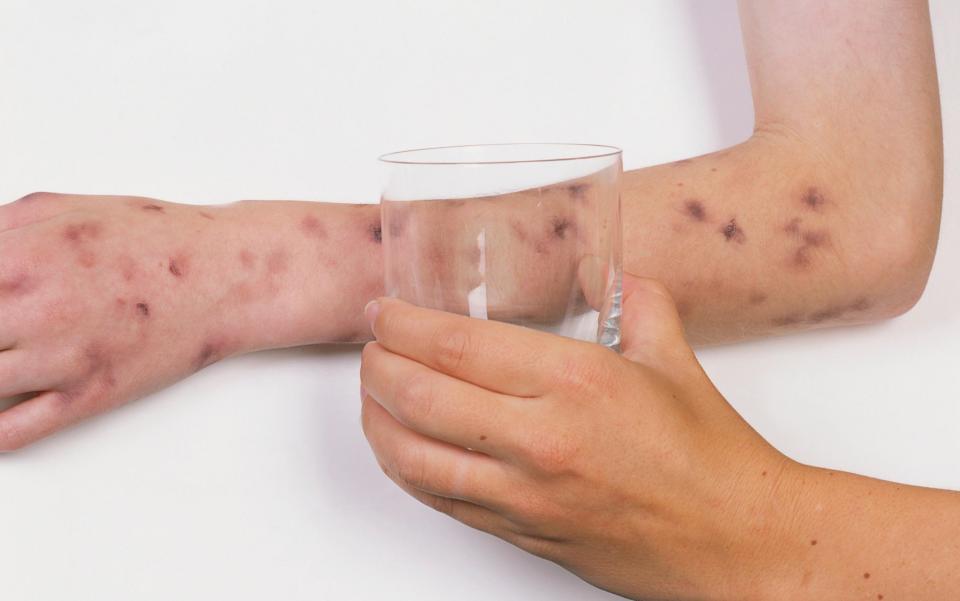What is meningitis, is it contagious and what are the symptoms?

Meningitis, particularly bacterial meningitis, can be deadly if left untreated: according to the World Health Organization, around one in six people affected by this type of meningitis die, and around one in five suffer from severe, long-term complications. Meningitis is contagious and can be transmitted by asymptomatic carriers, infecting anyone of any age. Therefore, understanding what causes it, what the symptoms are and how to protect against it is vital for the health of you and your family.
What is meningitis?
Meningitis takes its name from the membranes it affects and inflames, which are called meninges. These surround and protect the brain and spinal cord. Dr Stuart Sanders, a GP at the London General Practice, a private clinic in Harley Street, describes it as “an infection affecting the brain, which can be caused by bacteria entering the bloodstream and is most commonly due to a meningococcus”. This is a bacteria commonly carried in the back of the nose and in the throat, even by those who are not unwell.
Pneumococcus, tuberculosis or haemophilus bacteria may be at the root of the illness too, according to Sanders. “Meningitis can also be caused by a number of viruses including enteric, mumps or herpes viruses, although these are usually less serious,” he says.
Regardless of the cause, meningitis is a condition that demands urgent attention. Although both adults and children can be affected, meningitis tends to be more common in children, with the highest incidence among those under five.
What are the signs and symptoms of meningitis?
Because some of the symptoms of meningitis are flu-like, self-diagnosis in the early stages can be tricky. According to Prof Vijay Nayar of Healthium Clinics, “The symptoms of meningitis can develop quite quickly and include a high temperature, headache, vomiting, a stiff neck and being unable to tolerate bright light. Symptoms of more severe infection include a rash that does not disappear when a glass is rolled over it, as well as drowsiness and fits. Urgent medical attention is required if some of these symptoms are present”.

What are the different types of meningitis?
According to the charity Meningitis Now, there are different kinds of meningitis, including bacterial, viral and fungal – although, says Claire Donovan, a helpline and information nurse manager at the charity, fungal meningitis is extremely rare in the UK.
“Viral meningitis is more common and usually less serious than bacterial meningitis,” she says. “Even so, the symptoms can be very similar, so urgent medical care should be sought to determine which type of meningitis it is.” Our bodies are usually quite good at fighting off the viruses that can cause meningitis, and with painkillers, rest and hydration, the body’s immune system will overcome the virus in around seven to 10 days. However, viral meningitis can still make someone feel very ill, and full recovery can take some time.
Several types of virus can cause meningitis, including the mumps virus, the herpes simplex virus (which usually causes genital warts and cold sores) and enteroviruses, which tend to only result in mild stomach discomfort.
The reason why bacterial meningitis can be so dangerous is because of the rapidity with which harmful bacteria can multiply, and the way that bacteria can overcome our natural defences. “Certain bacteria have the ability to invade the blood-brain barrier, which helps to protect the brain from harmful substances,” says Donovan. With the meninges infected, bacterial meningitis can quickly become fatal if left untreated, and it can have severe consequences for survivors, such as limb amputation if sepsis results.
Because the symptoms of bacterial and viral meningitis are so similar, you should seek urgent medical help if you have them: only medical examination will be able to determine which type of meningitis is present.
Is meningitis contagious?
Meningitis is not highly contagious and the infecting organism can live harmlessly in people’s noses or throats. According to Meningitis Now, “Around 10 per cent of the population carry meningococcal bacteria (one of the most common causes of bacterial meningitis) in the back of their throat at any one time.”
This “carrier state” can last for several months before disappearing, but in this time these asymptomatic carriers can transmit the illness via “droplets”, through sneezing, coughing or intimate kissing. In most cases, the carriage of these bacteria does not cause illness, and it is only rarely that the bacteria overcome the body’s defences and cause meningitis.
“Meningitis can also be caught from someone else with the illness,” says Dr Safia Debar, a GP executive health at Mayo Clinic Healthcare in London. “Whether the infection takes hold will depend on the susceptibility of the individual.” In other words, if your immunity is high, you can be in contact with someone who has or carries meningitis but not get it.
How is meningitis treated?
According to Nayar, “People who are suspected of having meningitis should have tests in hospital to establish whether it is viral or bacterial.” This is done via a lumbar puncture, where a needle is inserted into the base of the spine to withdraw fluid that will then be examined for an accurate diagnosis.
As viral meningitis is less serious it can often be dealt with at home, as it tends to get better on its own within seven to 10 days with adequate rest and fluids, plus painkillers where necessary.
“Bacterial meningitis, on the other hand, requires antibiotics and needs to be treated in hospital,” he says.
Nayar adds that immediate, emergency treatment is essential for bacterial meningitis. “Although viral meningitis rarely causes any long-term problems, bacterial infections can lead to complications, especially when not treated quickly,” he says.
What are the complications of meningitis?
In severe cases, meningitis can lead to death, says Dr Chun Tang, a GP and medical director at Pall Mall Medical, a private healthcare clinic in Manchester. Other potential complications include neurological damage and hearing loss.
According to the Meningitis Research Foundation, the problems following meningitis can be temporary or permanent, and can encompass both physical and mental health issues, including brain damage.
“The membranes around the brain are like a bag of fluid,” explains Claire Donovan. “When these become inflamed with meningitis, the intracranial pressure can press down on the brain and cause damage.”
After-effects of meningitis include memory loss and difficulty concentrating, reduced physical coordination and balance, headaches, problems with speech, sight and hearing, physical weakness and spasms, and mental health or behavioural issues. If septicaemia is brought on by meningitis, then damage to the kidneys and lungs can result, as well as joint pain and stiffness. In extreme cases, amputation may be required to remove damaged tissue and prevent the infection spreading further throughout the body.
Who is most at risk of meningitis?
Meningitis can affect anyone, especially if they have been weakened by a coexisting illness or infection, says Sanders. However, newborn babies and young children are at the greatest risk of contracting the illness. This is because their immune systems are not yet fully developed, which also means that premature babies are even more vulnerable. Other heightened risk factors for young children include those who suffer frequently with sinus infections, have cochlear ear implants, or have recently sustained a head injury.
Is there a vaccination to prevent meningitis?
Yes, says Nayar, adding that vaccinations are our best defence against the illness, providing some protection against certain types of meningitis.
“Some of these vaccinations are given to babies as part of the routine childhood immunisation programme and a further vaccine is offered to teenagers and young adults,” she says. “These are safe and effective, and the combination of infant and adolescent vaccinations provides good protection against this potentially life-threatening infection.”
However, adds Donovan, not all types of meningitis are covered by vaccines, and no vaccine offers 100 per cent protection. This is why it is still vital to seek medical help if symptoms are detected, even if someone has been vaccinated.

Which types of vaccines are available?
Meningococcal vaccines protect against meningococcal bacteria, which can cause meningitis and septicemia. There are different groups of this bacteria, and correspondingly different vaccines: a MenB vaccine, which is offered to babies at two, four and 12 months; a Men C vaccine, offered to infants at 12 to 13 months; and a MenACWY vaccine, which is offered to young people between the ages of 14 and 25.
Pneumococcal bacteria can also cause meningitis and septicemia. A pneumococcal conjugate vaccine (PCV) protects against the 13 strains that most commonly cause disease, and is offered to babies at 12 weeks and 12 to 13 months.
A pneumococcal polysaccharide vaccine (PPV) is offered to anyone aged 65 years and over. While it protects against more strains than the PCV (23 rather than 13), it is only effective for a limited period and isn’t effective in children under the age of two.
Other vaccines available include Hib, which protects against Haemophilus influenzae type b bacteria which, prior to the introduction of the vaccine, were once the most common cause of bacterial meningitis in children under the age of five, and the BCG, which offers protection against tuberculosis meningitis. The MMR vaccine, while protecting against measles, mumps and rubella, is also important as mumps was a common cause of viral meningitis in children before this vaccine became available.
Spotting the signs of meningitis in children
Because small children are less able to verbalise their discomfort, and because vaccinations don’t protect against all types of meningitis, parents and carers need to be alert to the signs of meningitis, even if their child is vaccinated.
“Symptoms can develop suddenly and usually involve rapid deterioration,” says Dr Safia Debar. “Additionally, not all symptoms may be present at the same time; nor will they necessarily occur in a specific order. Symptoms relate to the inflammation of the protective covering of the brain with general infection, and sepsis which is when the infection enters the bloodstream.”
She urges parents and carers to follow their instincts and seek prompt medical attention. “Do not wait for a rash or drowsiness to seek help,” she says, adding that signs to be aware of include fever, lethargy, stiffness, vomiting, loss of appetite and a dislike of bright lights. Where a rash is present, try rolling a glass over it to see whether or not it fades. If it’s still red, that’s a warning sign. In babies, you may also notice that the fontanelle, the soft spot on the top of their head, is swollen, or bulging.

How to protect your child from meningitis
“Ensure your child receives the recommended vaccinations, including those against common meningitis-causing bacteria and viruses,” says Tang. “You should also encourage good hygiene to reduce the risk of viral infections and teach children proper handwashing and hygiene etiquette.” Further precautions include minimising contact with individuals who are coughing or sneezing, as meningitis can be transmitted via droplets, even from an otherwise healthy person. He also advises staying informed about meningitis symptoms, transmission and prevention strategies.
If your child exhibits symptoms, seek immediate medical attention. “If you are concerned about symptoms, you can call NHS 111 or your GP for help and advice,” says Donovan. “However, if someone is ill and getting worse, you should call 999.”
“Inform healthcare providers of your child’s symptoms and any recent illnesses,” says Tang. “Be assertive in expressing your concerns and share specific symptoms and observations. Request tests, including blood cultures and lumbar punctures – and if you feel your concerns are not being taken seriously, seek a second opinion or consult specialists.”
Recommended
Strep A: What are the symptoms and how infectious is it?


